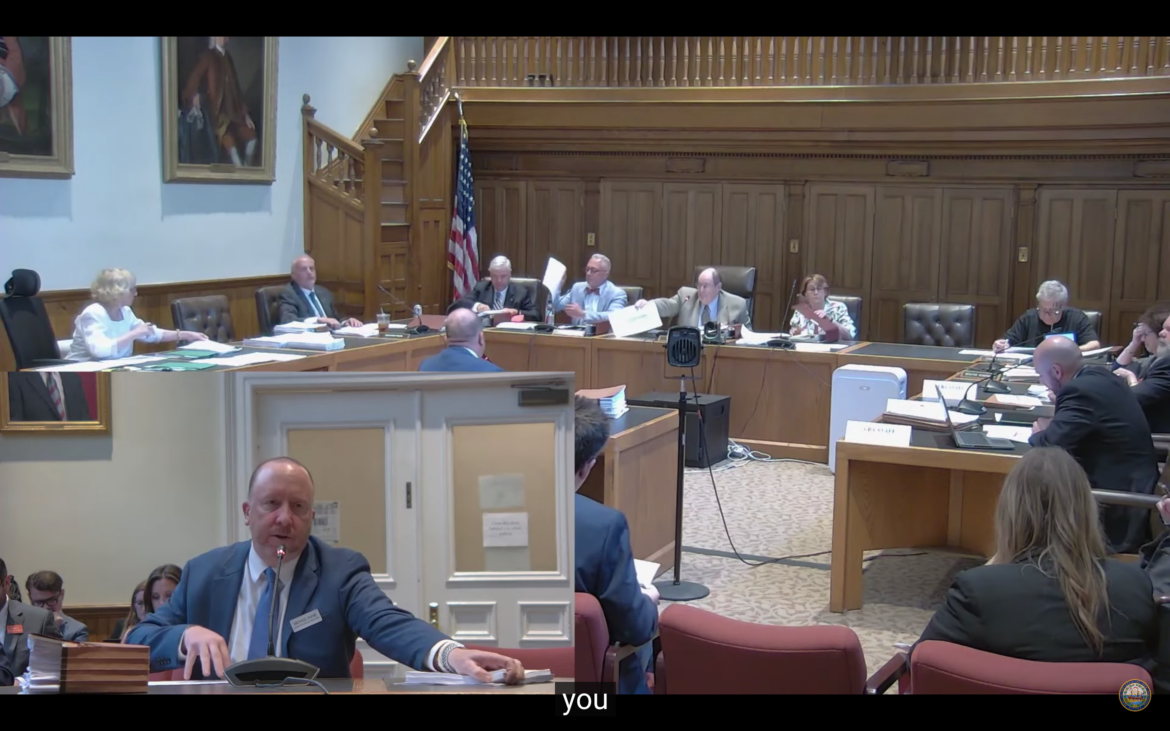By GARRY RAYNO, InDepthNH.org
CONCORD — The Senate Finance Committee approved its proposed $14.47 billion operating budget Thursday which the Senate will vote on next week.
The budget spends $6.4 million in general fund money, while total spending, which includes federal, highway, fish and game, and other funds, is $14.47 billion.
The Senate general fund spending compares to the House’s plan at $6.27 billion and the governor’s budget proposal at $6.36 billion.
Under the Senate plan, the budget balance at the end of the next biennium, which begins July 1, would be $236 million, with $3 million in general funds going into the state’s rainy day fund which would total $232.6 million.
While the committee unanimously approved its House Bill 1 recommendation, which contains the budget “numbers,” Democrats did not vote in support of House Bill 2, which contains the changes in law and policy that accompanies the budget numbers or appropriations. The vote was 5-2.
Sen. Lou D’Allesandro, D-Manchester, said the committee did “yeoman’s work” with many positive things, but he was concerned about several areas that continue to need addressing.
He and Sen. Cindy Rosenwald, D-Nashua, both were critical of a compromise with the House to extend the Medicaid expansion program for seven years instead of into perpetuity as the Senate had approved 24-0.
He said the budget has come a long way to address the housing crisis in the state but there is more to do, and D’Allesandro also said the first responders who comprise Group 2 of the New Hampshire Retirement System need to be made whole, instead of a commission to study enhanced benefits and the system’s long term stability.
“This document is the most important document a legislative body works on. It affects the lives of every individual in the state of New Hampshire,” D’Allesandro said. “Every person is affected by this document one way or another and that is why we have to get it right.”
He said he hopes changes can be made in the few days remaining before the Senate votes.
“The game is never over until we hit the finish line.” D’Allesandro said.
Rosenwald said she too was concerned about housing and the Group 2 problem, and the repeal of the interest and dividends tax at the end of the next biennium when she said the state may need the money, noting the surplus at the end of the biennium may not be enough to cover Medicaid program costs if the “wind down” of people to be pared from the program if they no longer qualify, does not happen as planned.
During the pandemic people on Medicaid could not be removed from the program even if their earnings changed.
Rosenwald also took issue with a $1.4 million appropriation for a border alliance that Gov. Chris Sununu wants and has been touted as a way to stop fentanyl from coming into the state.
She said the problem is not along the short New Hampshire border, but along the New York border
Rosenwald called the alliance a “political talking point.”
She did say she was pleased with the increase in Medicaid reimbursement rates and the work done on housing and child care.
The dissent prompted Senate President Jeb Bradley, R-Wolfeboro, to say while they appreciate much of what the budget accomplishes, “a no vote, is a no vote.”
He chided Rosenwald saying voting against the budget is voting against her own bill to increase Medicaid provider rates, or another bill to appropriate $15 million for child care.
He said they could criticize the seven-year extension of the Medicaid expansion program, but the bipartisan House budget proposal had a two-year extension.
“We have a responsibility to think about the 60,000 people (on the program who) expect us to be adults and not play politics and get the job done,” Bradley said. “Seven years gets the job done.”
He said the Senate approved a significant increase in state education aid and Manchester and Nashua are the two biggest winners in the new distribution formula.
He did not know how they could vote against that or the pay raise for state employees.
He also mentioned the increase in funding for mental health services and for higher education.
“I know we disagree on a handful of things. I hope you rethink (your positions) before we get to Wednesday,” Bradley said.
The budget institutes a new state education funding formula, undoes a change the House made in the Education Trust Fund, and increases state aid to the University System of New Hampshire, including targeting $6 million to reduce tuition at Keene State College and Plymouth University.
The Senate budget also includes money to expand the Education Freedom Account program making families earning up to 350 percent of the federal poverty level eligible. Rosenwald noted that includes between 40 and 45 percent of all the families in the state without having to review their income every year like other programs.
The budget contains a 12 percent pay raise over the two years of the biennium for state workers, and increases Medicaid reimbursements by more than $160 million.
Once the Senate votes on its budget, the House will have to decide if the changes are acceptable or if they want to negotiate a compromise of the two budget versions.
The current biennium ends June 30 so a new budget needs to be approved by July 1.
Garry Rayno may be reached at garry.rayno@yahoo.com.





